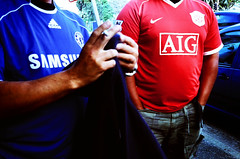The most important thing to come out of of this McClellan thing isn't that the war was propagandized, the Libby-Rove meetings or that he (McClellan) might be a turncoat who, as an insider, took two years to process something that many outsiders knew in 2003. That's all water under the bridge or a problem related to one administration. No, the important thing is the number of journalists that are saying they were spun or 'indirectly pressured' into doing positive stories on the president and the war pre-March 2003. It's a much scarier situation because the problem is systemic. When major, bottom-line drive corporations own our news outlets, how do you resist the urge to tell people what they want to hear?
Time agrees with him. I'd also add that a compounding factor is that the press inclines toward easy-to-grasp narratives. I don't mean to be unduly hard on the media, because actual reporting is much, much harder than blogging, but I think it bears mentioning that once a certain idea takes hold in the Washington press corp (Kerry is a flip-flopper, Gore said he invented the internet, Saddam is a direct threat and has WMD), it's like a stampede of buffaloes. No one can hold it back. Facts get crushed by "truth," at least for a time. And the financial pressure gave the prevailing narrative in 2003 a turbo boost.









